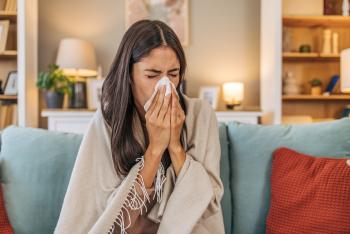Walking pneumonia is a mild but disruptive form of pneumonia with symptoms like a lingering cough...
Read MoreWhen many of us think about lung disease, we first think about lung cancer. However, hundreds of other chronic lung conditions and respiratory disorders make the simple act of breathing a daily challenge for millions of people around the world.
Understanding some of the most common chronic lung conditions can help you protect your health. If you’re affected, learn more about how daily management strategies can improve your quality of life.
Asthma is a prevalent chronic lung condition affecting over 8 percent of all children and adults in the United States. Asthma is due to inflammation and narrowing of the airways, which can lead to recurrent episodes of wheezing, breathlessness, chest tightness and coughing.
Asthma symptoms can be triggered by exercise, food or different environmental factors, such as pollution, smoke or allergens, like dust or pet dander. Appropriate treatment prevents asthma attacks and can help improve your quality of life.
“Understanding and avoiding your triggers are important. Talk to your health care provider about an asthma action plan so you can be prepared for situations in which your asthma flares up. Medications like inhalers are easy to use and hugely helpful in managing and controlling symptoms by opening airways and reducing inflammation,” said Patrick Ho, D.O., pulmonary physician at Inspira Medical Group.
Chronic Obstructive Pulmonary Disease (COPD) is an umbrella term for progressive lung diseases, such as chronic bronchitis and emphysema, that are often caused by long-term irritant exposure or smoking. COPD leads to symptoms such as chronic cough, shortness of breath and wheezing.
One of the most critical steps in COPD management is to quit smoking. Medications, primarily inhalers, improve lung function and alleviate symptoms. Pulmonary rehabilitation programs offer exercise and education to help you manage your condition. In severe cases, you may consider oxygen therapy and surgical interventions.
"Preventing COPD flare-ups or exacerbations is also extremely important, so stay up to date with all vaccinations that protect against respiratory infections, such as the flu, COVID and pneumococcal disease,” said Dr. Ho.
Pulmonary hypertension is characterized by high blood pressure in the pulmonary arteries, which carry blood from the heart to the lungs. The high blood pressure is caused by narrowing of the blood vessels in the lungs, which limits blood flow, resulting in shortness of breath, fatigue and chest pain. Uncontrolled chronic heart and lung disease are common causes.
Management of pulmonary hypertension can involve medications that help relax and dilate the blood vessels in the lungs.
“The treatment you receive for pulmonary hypertension depends on its underlying cause,” said Dr. Ho. “For example, medications that relax the blood vessels in the lungs can cause serious and possibly deadly (or harmful) side effects if the reason for having pulmonary hypertension is due to heart disease. Lifestyle modifications, like staying physically active or participating in a supervised program, can also help. In severe cases, you might need to consider a lung transplant.”
Interstitial lung disease (ILD) is an umbrella term used for a large group of chronic lung disorders characterized by inflammation and/or scarring (fibrosis) of the lungs. “The scarring causes stiffness, which makes it difficult to breathe and get oxygen to the bloodstream. The lung damage can potentially worsen over time without appropriate treatment and can also be irreversible,” said Dr. Ho.
Management involves identifying and addressing underlying causes, like environmental exposures or autoimmune conditions. Medications to reduce inflammation, slow progression, oxygen therapy and pulmonary rehabilitation can all help. In severe cases, a lung transplant is another possible treatment option.
“Unfortunately, some of these lung diseases aren’t curable, but early diagnosis, appropriate treatment and lifestyle changes can help slow progression in some cases, as well as manage symptoms and improve your overall quality of life,” said Dr. Ho.
From asthma to lung cancer, Inspira’s pulmonary team is equipped to evaluate, manage and treat a range of lung conditions. Learn more here.
Inspira Health is a high reliability organization (HRO), which means safety is the top priority for patients and staff. To make an appointment, call 1-800-INSPIRA.

Walking pneumonia is a mild but disruptive form of pneumonia with symptoms like a lingering cough...
Read More
Long COVID refers to a range of persistent symptoms that can linger for weeks, months or years after...
Read More
Hurkle-durkle refers to the cozy, mindful act of unwinding before bed, focusing on relaxation and...
Read More
The material set forth in this site in no way seeks to diagnose or treat illness or to serve as a substitute for professional medical care. Please speak with your health care provider if you have a health concern or if you are considering adopting any exercise program or dietary guidelines. For permission to reprint any portion of this website or to be removed from a notification list, please contact us at (856) 537-6772
